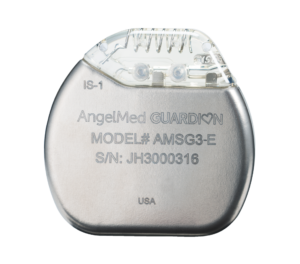 Angel Medical Systems (AngelMed) has announced US Food and Drug Administration (FDA) approval of the second-generation AngelMed Guardian device. The AngelMed Guardian system is an implantable cardiac detection monitor and patient-warning system for acute coronary syndrome (ACS) events, including silent heart attacks. The new, second-generation device is enhanced with ease-of-use adaptations and an updated, long life battery that could potentially double the life of the implanted device, AngelMed said in a press release.
Angel Medical Systems (AngelMed) has announced US Food and Drug Administration (FDA) approval of the second-generation AngelMed Guardian device. The AngelMed Guardian system is an implantable cardiac detection monitor and patient-warning system for acute coronary syndrome (ACS) events, including silent heart attacks. The new, second-generation device is enhanced with ease-of-use adaptations and an updated, long life battery that could potentially double the life of the implanted device, AngelMed said in a press release.
The AngelMed Guardian device is implanted subcutaneously during a low-risk, outpatient surgical procedure. Using a patented algorithm, the AngelMed Guardian continuously records the heart’s electrical activity, 24 hours a day, monitoring for electrical changes that can indicate an impending ACS event.
“Patients who have had a prior ACS event often remain at high-risk of a recurrent event. Even those patients who are on alert for another potential cardiac event may delay seeking treatment,” said C Michael Gibson, Boston Clinical Research Institute, Boston, USA. “The AngelMed Guardian system has demonstrated the ability to identify the earliest signs of an ACS event, including heart attacks, more effectively than patients’ symptoms alone, and in patients who do not experience symptoms at all.”
“The improved AngelMed Guardian device will have a meaningful effect on the current standard of patient cardiology care for ACS events. Our dedicated team and supporting physicians have worked tirelessly to bring this disruptive technology to market,” said AngelMed Chief Executive Officer, Brad Snow. “As the first real-time detection device for high-risk heart attack patients, the AngelMed Guardian System provides critical data at the point of care, along with peace of mind for physicians and patients alike.”
“Our key learnings based on hundreds of thousands of hours of clinical monitoring data for many ambulatory patients with cardiovascular disease provides a technology platform for future offerings. Our patient-centric approach will drive our research and development,” said Dave Keenan, AngelMed chief operating officer.










